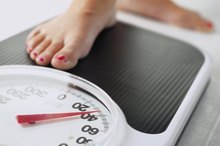Diet Plan to Lose 50 Pounds
Losing a large amount of weight requires willpower and dedication to a new, healthier lifestyle. While dropping 50 pounds may seem like a daunting task, setting goals and understanding dietary recommendations make dramatic weight loss achievable. Talk to your doctor before beginning a diet plan to determine if it is safe and healthy for you.
Setting Goals
Evaluate your physical fitness to determine appropriate personal goals. In addition to setting your goal weight, create smaller goals to achieve along the way. Think beyond simple weight loss benchmarks, and set goals about nutrition, exercise or lifestyle choices. For example, commit to decreasing soda consumption or eating more fruits and vegetables. The Centers for Disease Control and Prevention recommends making goals specific and realistic to keep yourself committed to a healthy lifestyle.
- Evaluate your physical fitness to determine appropriate personal goals.
- Think beyond simple weight loss benchmarks, and set goals about nutrition, exercise or lifestyle choices.
Dietary Needs
Easiest Way to Get Rid of Love Handles
Learn More
Your body sheds pounds when your net caloric intake decreases. The CDC reports that a reduction of 1,000 calories per day results in weight loss of 2 pounds per week. At this rate, you will lose 50 pounds in about six months. Use a calorie calculator to determine your estimated daily caloric needs. Subtract 1,000 calories through a combination of dietary changes and exercise. Keep track of your food consumption to help you meet this goal.
- Your body sheds pounds when your net caloric intake decreases.
- Keep track of your food consumption to help you meet this goal.
Meal Planning
Eat a balance of healthy fats, complex carbohydrates and lean protein to promote weight loss. The U.S. Department of Agriculture recommends that adults eat six servings of carbohydrates each day. Three servings should come from whole-grain sources such as brown rice, whole-wheat bread, wheat pasta, quinoa or buckwheat. These foods keep your energy levels high throughout the day. Aim to eat three servings each of fruits and vegetables daily. Avoid the saturated fat in many red meats by eating 6 ounces of lean protein from fish, nuts, lean beef, chicken or soy products. Drink three cups of milk each day to boost your calcium levels.
- Eat a balance of healthy fats, complex carbohydrates and lean protein to promote weight loss.
Considerations
How Many Calories Should I Eat to Lose Belly Fat?
Learn More
Fad diet plans and detoxifying cleanses claim to help your body lose weight fast. According to the American Heart Association, these quick-weight-loss plans cause dieters to rapidly regain the weight they lose. There are no magic diets or "superfoods" that help you lose 50 pounds within a few weeks. Changing your lifestyle to adopt a balanced diet promotes weight loss without risking your health. Combine dietary changes with 30 to 45 minutes of aerobic exercise three or four times per week for best results. Ask your doctor to help you devise a realistic diet and exercise plan that works for you.
- Fad diet plans and detoxifying cleanses claim to help your body lose weight fast.
- Ask your doctor to help you devise a realistic diet and exercise plan that works for you.
Related Articles
References
- U.S. Department of Agriculture: Choose My Plate
- Centers for Disease Control and Prevention: Getting Started
- American Heart Association: Diet and Lifestyle Recommendations
- Centers for Disease Control and Prevention: Losing Weight
- Best Way to Lose Weight, Guide to Behavior Change. National Heart Lung and Blood Institute. http://www.nhlbi.nih.gov/health/educational/lose_wt/behavior.htm.
- Johnston, B.C. (2014b) ‘Weight loss among named diet programs’, JAMA, 312(9), pp. 923–933. doi: 10.1001/jama.2014.10397.
- Malik VS, Schulze MB, Hu FB. Intake of sugar-sweetened beverages and weight gain: A systematic review.The American Journal of Clinical Nutrition. 2006;84(2):274–288. http://ajcn.nutrition.org/content/84/2/274.long.
- Office of Dietary Supplements - Dietary Supplements for Weight Loss: Fact Sheet for Professionals. National Institutes of Health. https://ods.od.nih.gov/factsheets/WeightLoss-HealthProfessional/.
- Weight control. Medline Plus. https://medlineplus.gov/weightcontrol.html.
Writer Bio
Aurora Harklute has been writing since 2009. She works with people with depression and other mental illnesses and specializes in physical and mental health issues in aging. Harklute holds a Bachelor of Science in psychology and physiology from Marquette University and a Master of Arts in cognitive psychology from the University of Chicago.









